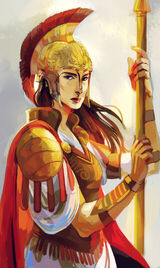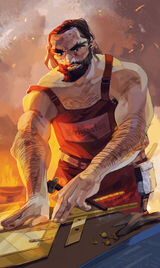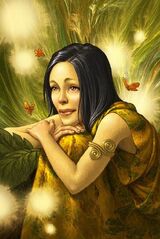No edit summary |
|||
| Line 1: | Line 1: | ||
| − | '''Gods''' are divine beings of immortals who control the forces of nature. They are related to the older [[Titan]]s, their ancestors and chief enemies. There are now 12 major gods who rule over the universe, the [[Olympians]], all of whom are under the rule of [[Zeus]], god of the sky. There are many other minor gods, who serve smaller but necessary purposes in the world. Despite their primal power and divine authority, they are subject to the divine laws, and cannot break oaths sworn upon the [[River Styx]], but still do sometimes. A male would be called a god, whereas a female would be called goddess, however god can be gender-neutral, applying to either female or male. |
+ | '''Gods''' are divine beings of immortals who control the forces of nature. They are related to the older [[Titan]]s, their ancestors and chief enemies. There are now 12 major gods who rule over the universe, the [[Olympians]], all of whom are under the rule of [[Zeus]], god of the sky. There are many other minor gods, who serve smaller but necessary purposes in the world. Despite their primal power and divine authority, they are subject to the divine laws, and cannot break oaths sworn upon the [[River Styx]], but still do sometimes. A male would be called a god, whereas a female would be called a goddess, however god can be gender-neutral, applying to either female or male. |
== History == |
== History == |
||
Revision as of 09:36, 25 November 2012
Gods are divine beings of immortals who control the forces of nature. They are related to the older Titans, their ancestors and chief enemies. There are now 12 major gods who rule over the universe, the Olympians, all of whom are under the rule of Zeus, god of the sky. There are many other minor gods, who serve smaller but necessary purposes in the world. Despite their primal power and divine authority, they are subject to the divine laws, and cannot break oaths sworn upon the River Styx, but still do sometimes. A male would be called a god, whereas a female would be called a goddess, however god can be gender-neutral, applying to either female or male.
History
Zeus, god of the sky
The six most powerful Greek gods and goddesses were Demeter, Hades, Hera, Hestia, Poseidon, and Zeus, perhaps because they are sons and daughters of the two Titans, Kronos, and Rhea. Fearing his children would overthrow him in the same way he had done to his father, Kronos devoured his first two sons and his three daughters after they where born. Hestia first, then Demeter, Hades, Poseidon and Hera. He would have devoured Zeus as well, but Rhea, unable to bear the pain of losing another child and seeing her husband now for the monster he was, managed to hide Zeus and give Kronos a rock to eat. Entering into an alliance with Gaea, Rhea was able to smuggle her son away to safety and gave her husband a rock instead to devour.

Poseidon, god of the sea
After years in hiding, Zeus was finally old enough and strong enough to overthrow his father, and returned to his father's palace to free his siblings who, being immortals, remained alive and undigested within their father all this time. According to some accounts, Zeus freed his family by smuggling a potion into his father's meal, forcing him to vomit up the children up. Having freed his siblings, as well as the Hekatonkheires and the Cyclopes whom Kronos had re-imprisoned in Tartarus, Zeus led a rebellion against the Titans. In gratitude, the Cyclopes forged the Big Three's symbols of power: the Master Bolt, the Trident, and the Helm of Darkness, while the sheer strength of the Hekatonkheires proved to be a great advantage against the Titan army.
The final blow was delivered when Zeus, using his father's own scythe, cut Kronos into a thousand pieces and dropped them in Tartarus where he would (hopefully) never rise again. This marked the end of the Titan age and started the Olympian age.
The Olympians have been challenged many times for their control of the world, but they have always come off on top, often with the help of their children, the demigods, like for example, when the Giants rebelled against the gods, Hercules helped them kill/vanquish the Giants.
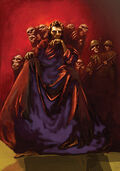
Hades, god of the Underworld
Zeus married his sister Hera, and subsequent children followed. Ares, Hephaestus, Hebe, Eris, Eileithyia, and Enyo. From affairs the other gods and goddesses were created. However Aphrodite was born when Ouranos' genitals touched the sea. Thus she is more powerful and the oldest of the gods, and an actual embodiment of love. She can influence the other gods and goddesses (although not the ones that are sworn to be eternally a virgin - Athena, Artemis, and Hestia).
Divine Form
Gods, in their natural, fully empowered form, are radiant with a divine light so intense that no mortal, non-god, or even demigod can look upon it without disintegrating to ashes. To interact with mortals and heroes, the gods take on a lesser form which can be safely observed. Gods can instantly call back this power any time they desire, and may even revert involuntarily to their divine form if experiencing intense emotions. In The Lost Hero, Jason looked at Hera's divine form for only a second before supposedly dying. Piper used her ability to charmspeak by calling out to Jason's soul to return to his body managing to bring Jason back to life (something Hera said was impossible though the reason could of been that Death was chained at the time).
Abilities
The gods are perfect superhuman beings. In addition to their universal immortality, all gods draw most of their power from their sphere of control or domain, but they all share certain powers and even abilities specific to their individual domains can sometimes overlap (such as Morpheus and Hypnos both whom have power over dreams/sleep).
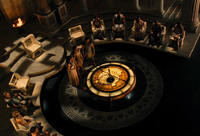
The Olympian Council. There are 11 gods shown.
Each of the Big Three, after overthrowing the Titans, each took one of the three largest physical domains on Earth (the heavens, the ocean, and the Underworld). This is why the Big Three are the most powerful and influential gods on Olympus.
Gods possess a nearly limitless amount of magical control over their domain, as well as many general powers including levitation, teleportation, telepathy, physical abilities that vastly surpass mortals, manipulating the elements, among other vast amounts of control over the world. The limits of a god's power in this regard is unknown, as is to what extent they can cross into the domain of another. Also, since that their true, divine form is too powerful to be looked by mortals or demigods, all gods can shapeshift into any form that they desired, even animals, as stated by the myths and the series.
However, gods are not all-powerful. They can tire or be defeated/overpowered by immortals and even demigods. If they choose to engage in physical battle they can be injured through the proper weaponry. Percy Jackson was able to wound Ares, destroy Hades' minions, and nearly defeat a weakened Hyperion all in combat, through use of his own powers, or some combination. However, because gods can exist in many places at one, only a fraction of their power is used in combat. Gods become so powerful in their divine form that simply looking at them is fatal for anything less than a god.
Gods can appear in multiple places at once, so long as their domain is being invoked. Dionysus was able to manifest at a party despite the fact that his true self was buried under a mountain. It is unknown how many of these "copies" can be made at once, or what powers the god retains while in this state.
Gods consume a divine food and drink called nectar and ambrosia. It is too powerful for mortals to eat under normal circumstances as they will literally burst into flames, yet in some myths the gods have used nectar and ambrosia to bestow immortality upon a mortal, though its more likely the nectar and ambrosia is specially prepared for a mortal. Demigods, however, can consume small amounts of both in order to regain strength and heal wounds, though too much will make them ill or destroy them in the same way it would a mortal.
Gods also adapt to their host country's culture when they move with Western Civilization and if they stay long enough it can become a permanent part of their aspects. The gods are also able to speak multiple languages. For example, Aphrodite can speak French, as it is the language of love as she is the goddess of love and beauty. Boreas can also speak French, but that is because he lives to the north in Quebec, and the official language of Quebec is French.
Roman Counterpart
As they follow the flow of Western Civilization, the gods will change slightly to reflect the culture of the country they currently reside in. Normally, this has only a small effect and are not permanent, such as Zeus wearing designer suits and Apollo's chariot becoming a sports car. But the gods resided in Rome almost as long as they ruled from Greece, and therefore each god has a Roman aspect to themselves that they can change into. In this form, the gods became more disciplined, warlike, and militaristic just like the ancient Roman Empire. As Roman gods, they rarely interacted with mortals or had affairs with them. When they did, however, these relationships produced Roman demigods who knew of their godly parent only by their Roman name, spoke Latin, and possessed a disciplined, ferocious and orderly quality not present in the Greek demigods at Camp Half-Blood. These Roman demigod children were sent to be trained by Lupa at The Wolf House, somewhere near San Francisco.
Aspect Confliction
While the gods are normally in harmony with both of their forms, this can change if their Roman and Greek children start fighting. Because both camps call their godly parents for help, both their Roman and Greek forms are at odds with each other, giving the gods splitting headaches, indecision, and focus problems. Bacchus even claimed that he had a hard time knowing what he was doing, where he was going, and was constantly grumpy (which Percy considered normal for him). They are also slightly schizophrenic, as their forms will change from one form to the other if a demigod thinks about them in their other form, with Bacchus changing to Dionysus for only a flash when Percy said he knew him from Camp Half-Blood, leading to Bacchus yelling at Percy to stop thinking about him in that form.
The gods different aspects also seem to have little knowledge of the actions of the other. Mars for example didn't remember ever fighting Percy Jackson while he was Ares, his Greek form. Minerva also seems to not recognize Annabeth Chase, the child of her Greek aspect Athena. Minerva also has problems reading a simple subway map because of her inability to focus in her Roman form. Even Bacchus has problems remembering Percy until he mentions Camp Half-Blood, causing him to transform into Dionysus for a second.
While this happens to most of the Olympian gods, other gods that don't change much when changing aspects or don't have another aspect aren't effected. The most obvious example is Aphrodite, who changed very little when she became Venus to the Romans. Because of this, she likes to think that she hasn't aged at all. Other gods include Nemesis, the goddess of revenge as revenge is universal. Bellona the war goddess is a purely Roman goddess and has no Greek form. Bacchus appears to not suffer as much as the other Olympians, but still suffers headaches.
Divine Laws
Despite their primal powers and divine authority, gods are bound by certain laws. Some of these rules are laid down by Zeus and others are just in the nature of being a god. Only a few of these rules have been explored.
- No god can directly steal the symbol of power of another. This applies to both the Titans and Olympians and is why Zeus knew a hero or mortal had to have stolen his Master Bolt as mortals and demigods are free from this rule.
- No god can enter the domain of another unless invited by the lord/lady of said domain (unless their domain overlaps). The only known gods to freely travel the worlds are Hermes and Iris, both of which are the messenger god/goddess respectively.
- It is stated by Chiron that immortals can only fight demigods after being challenged or attacked first (however the Titans have been shown to ignore this rule). It is likely though, that this rule is not compulsory.
- Gods are limited to how much they can interfere in mortal affairs. This rule is a decree of Zeus. It also depends on how much Zeus enforces it or knows about it as gods have been known to interfere when they were not supposed to, with nothing happening to them, like Apollo in The Titan's Curse, or Hera in The Battle of the Labyrinth.
- The Big Three were banned from having children after World War II because their children were deemed "too powerful." This rule had been broken by Zeus and Poseidon, Zeus broke it by siring Thalia Grace. Poseidon broke the rule by having Percy Jackson. Hades was the only god of the Big Three to keep true to his oath and not sire any more children, as his two youngest children, Bianca and Nico di Angelo were already born before the oath was made. This rule was banished at the end of The Last Olympian by Percy Jackson, son of Poseidon, due to him completing the Great Prophecy.
Weaknesses
The gods do possess some weaknesses, physical or otherwise. They can be injured by supernatural weapons such as those made from Celestial bronze, Stygian iron, and Imperial Gold. If a god's domain is attacked, he/she may weaken, age, and take the form to represent their current state of said domain, such as Poseidon did when Oceanus made war on his palace in the Last Olympian. Gods can also fade from existence should they lose the will to live, either from a lack of worship or the diminishing of their domain. Gods such as Pan, Helios, and Selene have allowed themselves to fade because their realm was either too small to rule (Pan) or they became unnecessary due to the fact that the Romans lacked worship of a specific god (Helios and Selene). However, since the Titans were able to survive despite lack of worship or the loss of their domains and based on statements from various monsters the (major) key is will to live.
A god can survive lack of worship or loss of their domain so long as their will to live is strong enough. Otherwise, they will fade. If their thrones (or other sources of power) are destroyed, they will also fade along with it or become so weakened that they can no longer take a physical form, as stated in The Last Olympian by Prometheus.
Gods also are in general lustful (with the exceptions of Maidens or most wives, such as Hestia, Hera, and Amphitrite), and often have many illegitimate children, both immortal and demigod. Most gods also tend to be petty or immature. Because the gods have been around so long, they feel little reason to change (except to adapt to their current home), often resulting in broken promises.
In addition, the gods can be very prideful of the things they do or the choices they make. They are often too proud to admit when they need help or when they're wrong, instead believing themselves to be beyond help from regular mortals and instead should be feared and respected, even if they haven't earned it. They see admitting they need help as a sign of weakness instead. The gods will furthermore show signs of contempt towards the children of their enemies, sometimes even if those children are the offspring of other gods. It's these traits that often cause many beings to hate the gods and why sometimes the gods are viewed as being no better than the Titans.
If a god or goddess is trapped (in a magical prison etc.), his or her power is useless. An example of this is Hera being trapped within Gaea's cage in The Lost Hero or Artemis after being tricked to hold the sky in Annabeth's place during The Titan's Curse.
List of Gods
- Main article: List of Deities

Morpheus, God of Dreams
Greek Gods
Olympian Gods
- Zeus
- Poseidon
- Hades
- Hera
- Hestia
- Demeter
- Hermes
- Apollo
- Artemis
- Ares
- Aphrodite
- Athena
- Hephaestus
- Dionysus
Other Gods
- Hecate
- Persephone
- Morpheus
- Hypnos
- Iris
- Eris
- Tyche
- Nemesis
- Nike
- Hebe
- Enyo
- Phobos
- Deimos
- Aeolus
- Boreas
- Zephyrus
- Thanatos
- Charon
- Delphin
- Khione
- Pan
- Heracles
- Palaemon
- Notus
- Maia
- Eurus
- Achelous
Roman Gods
Other Gods
Trivia
- In The Kane Chronicles, there are references to a group of Egyptian gods and magicians that reside in Brooklyn and elsewhere, though they don't like to interact with each other, often avoiding to go to Manhattan. This seems to imply that the Greek and Egyptian gods may coexist in the same world as they are both connected to the Western Civilization, though the same passage also states that the two pantheons must not meet, possibly reflecting the historical conflicts between Ancient Egypt and Rome. The nature of their connection, if there is any, is unknown though Thoth implies that he met Hermes (and that it didn't go well).
- Grandma Zhang mentions Chinese gods and Dragons. It is unknown if this implies they exist as well; as much as Cherokee myths and divine beings have been mentioned in The Lost Hero. However, it is unknown if they were just myths, another pantheon of gods like the Egyptian Pantheon or the same Olympian gods only in a different form.
- In The Son of Neptune, after Percy take a ride with a Inuit Indian (who also tells Inuit myths and gods), Percy starts to believe that other gods beyond Greeks-Romans might exist, but given that his life is already quite complicated, he prefers to not think much about it.
- Other mythical beings are not yet confirmed to exist except for the Egyptian, Roman, and Greek Pantheons.
- It is still a mystery if there are other forms the gods adopted due to the transfer of the flame; like taking Roman forms when the flame moved to Rome. They may have taken other names and other mythical forms or they just adopted mortal forms in where the flame was strongest.
- It is unknown apart from the stories of Greek mythology if the gods had any other children with other gods, this might be possible, except those gods may have far smaller roles than the minor gods, In The Titan's Curse, Annabeth is seen dancing with a minor godling.
- Gods do not have DNA.
- God was briefly mentioned in the first book.




